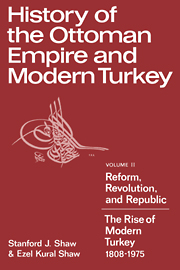Book contents
- Frontmatter
- Contents
- List of Tables
- Preface
- Preface to the second printing
- List of Abbreviations
- Note on Pronunciation
- Map of the Growth of the Ottoman Empire, 1280–1683
- Map of the Decline of the Ottoman Empire, 1683–1975
- 1 The Beginnings of Modern Ottoman Reform: The Era of Mahmut II, 1808–1839
- 2 The Era of Modern Reform: The Tanzimat, 1839–1876
- 3 Culmination of the Tanzimat: The Reign of Abdulhamit II, 1876–1909
- 4 The Young Turk Period, 1908–1918
- 5 The Turkish War for Independence, 1918–1923
- 6 The Turkish Republic, 1923–1975
- Appendix
- Bibliography: History of the Ottoman Empire and Modern Turkey, 1808–1975
- Index
Preface to the second printing
Published online by Cambridge University Press: 20 May 2010
- Frontmatter
- Contents
- List of Tables
- Preface
- Preface to the second printing
- List of Abbreviations
- Note on Pronunciation
- Map of the Growth of the Ottoman Empire, 1280–1683
- Map of the Decline of the Ottoman Empire, 1683–1975
- 1 The Beginnings of Modern Ottoman Reform: The Era of Mahmut II, 1808–1839
- 2 The Era of Modern Reform: The Tanzimat, 1839–1876
- 3 Culmination of the Tanzimat: The Reign of Abdulhamit II, 1876–1909
- 4 The Young Turk Period, 1908–1918
- 5 The Turkish War for Independence, 1918–1923
- 6 The Turkish Republic, 1923–1975
- Appendix
- Bibliography: History of the Ottoman Empire and Modern Turkey, 1808–1975
- Index
Summary
This second printing of Reform, Revolution, and Republic has provided an opportunity to incorporate many useful comments and to correct a number of errors.
We also have noted communications from Armenians who contend that we have failed to sufficiently take into account their situation in the Ottoman Empire and, in particular, their sufferings in the last half-century of the Empire, and that this was the result of overemphasis in the use of Ottoman sources.
We make no apology for using Ottoman sources for a history of the Ottoman Empire. For too long the Ottomans have been studied without the use of any of their sources, resulting in serious distortion and error. No history of France would be considered methodologically sound and balanced if it were written on the basis of English and Italian observations. At the same time, however, we have made use of a mass of relevant non-Ottoman materials, as is evident in the Bibliography.
No one denies, or seeks to deny, that the Armenian people suffered terribly during the last years of the Ottoman Empire. We do make this clear, but in the context of Ottoman history. What may be overlooked is that the experience of the Armenians, however terrible it undoubtedly was, was not unique to them. It was part of a general tragedy that engulfed all the people of the Empire – Turks, Greeks, Armenians, Arabs, Jews, and others, all of whom have traumatic memories of the period.
- Type
- Chapter
- Information
- Publisher: Cambridge University PressPrint publication year: 1977



